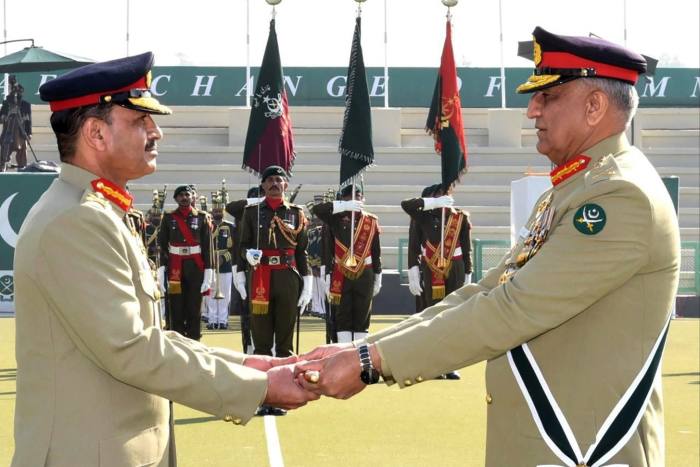Pakistani former spymaster Asim Munir takes over as country’s army chief

Low-profile Pakistani former spymaster General Asim Munir donned his dress uniform this week for a parade-ground ceremony marking his rise to what is arguably his nation’s most powerful position: army chief.
The 500,000-strong army is widely considered Pakistan’s dominant institution, playing a crucial behind-the-scenes role in decision making in the nuclear-armed south Asian nation of 220mn people.
Munir, a former head of the Inter-Services Intelligence agency, took control of the military for a three-year term at a ceremony on Tuesday that was attended by retiring head Qamar Javed Bajwa and top officers, ministers and diplomats.
Prime Minister Shehbaz Sharif selected Munir, the most senior general, from a shortlist of candidates supplied by the army. Pakistani leaders, diplomats and analysts will now look to him for signs of policy direction not only on security, but also on a host of domestic issues and on the future of relations with friends and foes including the US, China and India.
Munir steps into the position as Pakistan grapples with political and economic crises and with talks with the IMF that observers say are crucial to avoid it defaulting on its debts.

Pakistan is also facing growing security challenges as the military fights a war of attrition against Islamic extremists. The Pakistani Taliban, an offshoot of the Afghan militant group, this week called off a ceasefire and ordered its forces to carry out attacks across the country.
One of Munir’s most important challenges, however, will be to defend the army itself, following months of intense public criticism from the wildly popular former prime minister Imran Khan and his Pakistan Tehreek-e-Insaf party.
“Munir will have to try to restore confidence in the institution with a polarised public,” said Elizabeth Threlkeld, a senior fellow at the Stimson Center think-tank in Washington.
Since Khan was ousted from office in a parliamentary no-confidence vote in April, his supporters have alleged, without offering evidence, that the military enabled his removal. And Khan has blamed an attempt on his life earlier this month on a conspiracy involving a military official and his arch-rival Sharif.
Both strongly deny Khan’s allegations. But Hasan Askari Rizvi, a commentator on national affairs, said Munir would be under pressure to counter the view the military meddled in civilian politics. The new chief needed the armed forces to be “seen to have stepped back from politics and appear to be neutral”, Rizvi said.
Yet former generals acknowledge the army is central to national decision making. And they argue that it is the only institution with the clout to manage Pakistan’s competing political, ethnic and economic interests.
“There has to be someone who can bring diverse opinions on to a common platform,” said Ghulam Mustafa, a former lieutenant general. “In Pakistan, that duty has fallen on the army to hold things together.”

The army’s central role in governing Pakistan is not new. Generals have ruled openly through martial law for nearly half of the country’s 75-year history.
Since the last military ruler, General Pervez Musharraf, stepped down in 2008, the country has moved towards what political scientists call a “hybrid” model that blends civilian electoral politics with military rule.
The military’s outsize role has long been subject to scrutiny at home and overseas. For example, while it was an important Nato partner during the war in Afghanistan, foreign officials repeatedly accused elements within the armed forces of quietly supporting Taliban militants.
After Bajwa was appointed for the first of two terms in 2016, he tried to restore western confidence in the army and also helped broker a ceasefire along the country’s contested border with India, with which Pakistan has fought multiple wars.
“Foreign policy [and] security issues inevitably bring the army to the table,” said Abdul Basit, a former Pakistani ambassador to India.
Analysts say the army under Bajwa enabled Khan’s rise to power in 2018 by influencing regional parties and independent politicians to join the former cricketer’s parliamentary coalition. They say the pair fell out while in office, paving the way for Khan’s removal in April’s no-confidence vote.
Munir, who is known as a pious Muslim, is the son of a school principal and served in Saudi Arabia during his career as well as a commander in Pakistan’s populous Punjab province.
He was named chief of the ISI spy agency in 2018, but was ousted by Khan after less than a year. Some observers interpreted Sharif’s selection of Munir as an attempt to install a figure who would be sympathetic to his government.
Others disputed that interpretation, pointing out that Munir was the most senior among the candidates. “If history is any guide, the incoming chief will prioritise the interests of the army over any perceived political association,” Threlkeld said.
Share this news on your Fb,Twitter and Whatsapp
Times News Express:Latest News Headlines
Times News Express||Health||New York||USA News||Technology||World News